
GMS Hygiene and Infection Control
Scope & Guideline
Innovating hygiene practices for a healthier tomorrow.
Introduction
Aims and Scopes
- Infection Prevention and Control:
The journal focuses on strategies and guidelines for preventing healthcare-associated infections, emphasizing evidence-based practices in hospital settings. - Antimicrobial Resistance:
Research on the trends and mechanisms of antimicrobial resistance, including studies on resistant pathogens and effective treatment protocols, is a core aim. - Hand Hygiene and Antisepsis:
The journal highlights studies on hand hygiene practices, the efficacy of hand antiseptics, and policy recommendations for improving compliance among healthcare workers. - Public Health and Hygiene:
Topics related to public health interventions, vaccination campaigns, and community hygiene practices are explored to enhance overall population health. - Innovative Disinfection Techniques:
Research on new disinfection methods, including the efficacy of various agents and technologies in reducing microbial load in healthcare environments.
Trending and Emerging
- COVID-19 Related Research:
A significant increase in studies focused on COVID-19, including infection control measures, vaccination strategies, and the impact of the pandemic on healthcare practices. - Antimicrobial Stewardship:
Growing emphasis on antimicrobial stewardship programs to combat resistance, with research exploring healthcare professionals' attitudes and practices. - Innovative Technologies in Hygiene:
Emerging interest in innovative disinfection technologies, such as the use of UV light, antimicrobial coatings, and novel antiseptics, to enhance infection control. - Community Health Interventions:
Increased focus on community-based hygiene measures and public health initiatives aimed at preventing infections in broader populations, especially in vulnerable groups. - Mental Health and Infection Control:
Recognizing the psychological impact of infectious disease outbreaks, there is a rising trend in research exploring the mental health implications for healthcare workers and patients.
Declining or Waning
- Traditional Infection Control Methods:
There appears to be a diminishing focus on conventional infection control practices that do not incorporate recent technological advancements or modern methodologies. - Basic Hygiene Practices:
Research on basic hygiene practices, such as general handwashing techniques without specific applications or contexts, is becoming less prominent. - Single Pathogen Studies:
Studies that focus exclusively on single pathogens without considering the broader context of antimicrobial resistance and co-infections are appearing less frequently.
Similar Journals
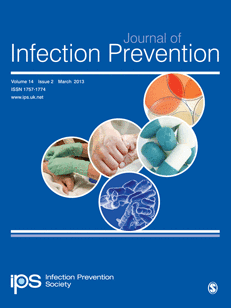
Journal of Infection Prevention
Empowering practitioners with evidence-based infection prevention strategies.Journal of Infection Prevention, published by SAGE Publications Ltd, is a pivotal resource in the fields of nursing, public health, and infectious diseases. With an ISSN of 1757-1774 and an E-ISSN of 1757-1782, this journal primarily serves as a platform for disseminating innovative research and comprehensive reviews aimed at enhancing infection control practices and health policy formulation. As of 2023, it holds a prestigious position within category quartiles, ranking Q2 in Advanced and Specialized Nursing and Q3 in Health Policy, Infectious Diseases, as well as Public Health, Environmental and Occupational Health, underscoring its relevance and influence in these arenas. Researchers, practitioners, and students are encouraged to explore the journal's content to contribute to the advancement of infection prevention strategies and the overall improvement of healthcare systems. With a convergence timeline from 2009 to 2024, the Journal of Infection Prevention is committed to publishing high-quality articles that address current challenges in infection control, thus playing a crucial role in the ongoing dialogue among health professionals.
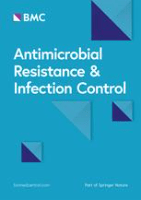
Antimicrobial Resistance and Infection Control
Pioneering studies for effective infection management.Antimicrobial Resistance and Infection Control is a leading open access journal published by BMC, dedicated to the dissemination of research in the critical area of antimicrobial resistance and its impact on infection control practices. Since its inception in 2012, the journal has quickly established itself as a vital resource for researchers, healthcare professionals, and policymakers, featuring a robust array of studies that address the escalating threats posed by antimicrobial resistance across various contexts. With its impressive Q1 rankings across multiple categories—including Infectious Diseases, Microbiology, Pharmacology, and Public Health—the journal’s influence is underscored by its consistent placement in the upper echelons of academic research. Furthermore, it holds commendable ranks in Scopus, with percentiles placing it in the top tier of its respective fields. The journal serves as an essential platform for innovative research and discussions aimed at curbing the threats of antimicrobial resistance, thereby supporting the global health community in striving for effective solutions to safeguard public health.
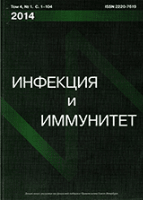
Infektsiya i Immunitet
Advancing knowledge in immunology and infectious diseases.Infektsiya i Immunitet, published by the esteemed SANKT-PETERSBURG-NIIEM IMENI PASTERA, is a prominent open access journal that has been disseminating vital research findings since 2011. Focusing on the fields of immunology and infectious diseases, this journal serves as a critical platform for scholars, professionals, and students in the Russian Federation and beyond. With an ISSN of 2220-7619 and an E-ISSN of 2313-7398, it currently holds a Q4 ranking in 2023 for both Immunology and Infectious Diseases, along with notable quartile standings in related fields. Despite its emerging status, Infektsiya i Immunitet provides valuable insights and contributes to the growing discourse on immunity and infection prevention strategies, making it an essential resource for those invested in advancing knowledge and enhancing public health outcomes. Researchers can conveniently access its wealth of articles and studies that bridge theoretical understanding and practical implications in their respective domains.
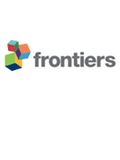
Frontiers in Cellular and Infection Microbiology
Advancing the frontiers of microbiological discovery.Frontiers in Cellular and Infection Microbiology, published by FRONTIERS MEDIA SA, is a leading Open Access journal that has been at the forefront of microbiological research since 2011. Located in Switzerland, this journal aims to provide a platform for innovative and impactful studies in various domains including immunology, infectious diseases, and medical microbiology. With an impressive range of quartile rankings—Q1 in Infectious Diseases, Microbiology, and Microbiology (medical), and Q2 in Immunology—as of 2023, it positions itself as a highly reputable source in the academic community. Furthermore, its Scopus rankings highlight its significance within the respective fields, with top percentiles in key categories, making it an essential resource for researchers, professionals, and students alike. As an Open Access publication, it ensures that vital findings are accessible to a global audience, fostering collaboration and advancement in science.
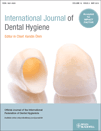
International Journal of Dental Hygiene
Empowering Excellence in Oral Health PracticesInternational Journal of Dental Hygiene is a leading scholarly publication in the field of dentistry, specifically focused on advancing knowledge and practices in dental hygiene. Published by WILEY, this journal boasts an impressive ranking of Q2 in the Dentistry (miscellaneous) category for 2023, positioning it among the top journals in its field with a Scopus ranking of #7 out of 43, reflecting an 84th percentile standing. Since its inception in 2003, the journal has provided a platform for researchers, practitioners, and students to disseminate innovative findings and best practices, contributing to the evolving landscape of dental hygiene. Available in both print and electronic formats, the journal offers a wealth of resources that empower professionals and enrich academic pursuits in oral health. By fostering a deeper understanding of dental hygiene's role in public health and clinical practices, the International Journal of Dental Hygiene continues to play a crucial role in promoting excellence in this vital healthcare discipline.

Current Infectious Disease Reports
Illuminating the Path of Infectious Disease DiscoveryCurrent Infectious Disease Reports, published by SPRINGER, is a leading journal dedicated to advancing knowledge in the field of infectious diseases. With an ISSN of 1523-3847 and an E-ISSN of 1534-3146, this peer-reviewed journal has established itself as a vital resource for researchers and healthcare professionals since its inception in 1999. The journal's impact in the academic community is underscored by its Q1 ranking in Infectious Diseases for 2023, placing it in the top quartile of influential journals in the field. Furthermore, it holds a respectable position at rank #95 out of 344 in the Scopus database, reflecting its substantial contribution to medicine and public health. While currently not an open access journal, it offers a wealth of articles covering the latest research, case studies, and reviews, making it an indispensable tool for those aiming to stay at the forefront of infectious disease science. As we navigate an era marked by emerging and re-emerging infectious threats, Current Infectious Disease Reports remains committed to providing high-quality, relevant research that supports evidence-based practice and informs future studies globally.

Infection Prevention in Practice
Fostering collaboration for effective infection prevention practices.Infection Prevention in Practice is a leading academic journal published by ELSEVIER that has established itself as a vital resource in the domains of Infectious Diseases and Public Health. With its Open Access policy implemented since 2019, the journal enhances global accessibility to cutting-edge research and practical insights aiming to reduce the risk of infections in various settings. It proudly holds a Q3 ranking in Infectious Diseases and a Q2 ranking in Public Health, Environmental and Occupational Health as of 2023, showcasing its impact and relevance within the scientific community—particularly with a Scopus rank placing it in the 71st percentile for public health research. Its scope includes the latest advancements, strategies, and practices in infection prevention, making it an indispensable read for researchers, healthcare professionals, and students dedicated to improving health outcomes and combating infectious diseases effectively. The journal operates from its base in the United Kingdom and reaches a global audience, fostering collaboration and innovation in infection control practices.
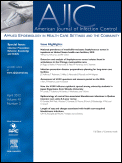
AMERICAN JOURNAL OF INFECTION CONTROL
Transforming healthcare through evidence-based practices.The American Journal of Infection Control is a leading peer-reviewed publication dedicated to advancing the field of infection prevention and control. Published by Mosby-Elsevier, this journal has been a crucial resource since its inception in 1980, focusing on the intersection of infectious diseases, public health, and health policy. As of 2023, it holds an impressive Q1 ranking in both Health Policy and Public Health, Environmental and Occupational Health, while also achieving Q2 rankings in Epidemiology and Infectious Diseases. With an increasing impact factor and a strong reputation reflected in its Scopus rankings, the journal appeals to researchers, health professionals, and students committed to preventing the spread of infections and enhancing healthcare safety. Although it does not currently offer Open Access, the journal ensures broad dissemination of its vital research through various subscription options. By fostering interdisciplinary collaboration and evidence-based practices, the American Journal of Infection Control plays a pivotal role in shaping effective infection control policies and practices worldwide.
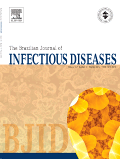
Brazilian Journal of Infectious Diseases
Unlocking the latest breakthroughs in infectious disease research.The Brazilian Journal of Infectious Diseases, published by Elsevier Brazil, is a premier open-access journal dedicated to advancing research and clinical practice in the field of infectious diseases. Since its inception in 2001, this journal has been pivotal in disseminating innovative studies and reviews that inform healthcare professionals and researchers alike. With an impressive impact factor reflected by its ranking in the second quartile for Infectious Diseases and third quartile for Medical Microbiology in 2023, the journal ranks #127 out of 344 in medicine – infectious diseases and #61 out of 140 in medical microbiology, showcasing its reputable standing in the scientific community. The Brazilian Journal of Infectious Diseases invites contributions that highlight significant findings, novel methodologies, and critical reviews aimed at enhancing patient care and public health initiatives. With an international readership and a focus on pressing issues in infectious diseases, it serves as an essential platform for knowledge exchange and collaboration among scholars and practitioners across Brazil and beyond. By reinforcing the importance of open access to scientific literature, this journal not only promotes transparency but also enhances the global discourse surrounding infectious diseases.

Infectious Diseases and Clinical Microbiology
Uniting scholars to combat infectious diseases worldwide.Infectious Diseases and Clinical Microbiology is a pivotal journal dedicated to advancing our understanding of infectious diseases through rigorous scientific research and clinical practices. Published by DOC DESIGN INFORMATICS CO LTD, this journal serves as a vital platform for researchers, healthcare professionals, and students keen on enhancing their knowledge of microbiological sciences and the clinical implications of infectious agents. With an ISSN of 2667-646X, it aims to disseminate significant findings in the field, enriching the scholarly dialogue surrounding infectious diseases. While currently operating under a traditional access model, the journal encourages global collaboration and knowledge sharing, striving to make a meaningful impact in tackling the challenges posed by infectious diseases. Its content aims to bridge the gap between laboratory research and clinical application, making it an essential resource in the contemporary landscape of global health.